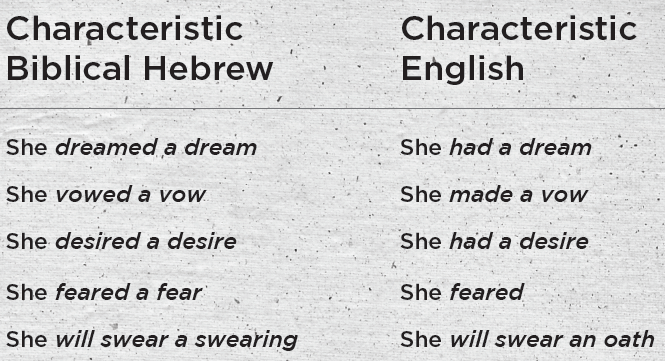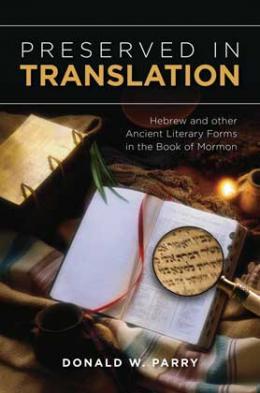Cognate Verbs and Objects
Donald W. Perry, “Cognate Verbs and Objects,” in Preserved in Translation: Hebrew and Other Ancient Literary Forms in the Book of Mormon (Provo, UT: Religious Studies Center, Brigham Young University; Salt Lake City: Deseret Book), 105‒08.
"I have dreamed a dream" (1 Nephi 3:2)
The King James Version of the Bible records that Joseph of Egypt “dreamed a dream” (Genesis 37:5), which is a direct translation from the Hebrew Bible. It is typical in Biblical Hebrew for a verb and object in a sentence to share the same origin or root, a grammatical usage known as a “cognate accusative.”[1] There are numerous biblical instances of this form. For example:
wrote upon it a writing (Exodus 39:30)
if a man vow a vow (Numbers 30:2)
bind his soul with a bond (Numbers 30:2)
Many examples of the cognate accusative in the Hebrew Bible have been lost in the translation process, as the following passages demonstrate:
| King James Version | Literal rendering from the Hebrew Bible |
| Let the earth bring forth grass | Let the earth grass grass (Genesis 1:11) |
| when I bring a cloud | I will cloud a cloud (Genesis 9:14) |
| fell a lusting | desired a desire (Numbers 11:4) |
| swear an oath | swear a swearing (Numbers 30:2) |
| were they in great fear | they feared a fear (Psalm 14:5) |
| It shall blossom abundantly | it will blossom blossoming (Isaiah 35:2) |
| O Lord . . . cast forth lightning | O Lord . . . lightning [verb] a lightning [noun] (Psalm 144:5–6) |
Although English grammar allows the cognate accusative (e.g., “to sing a song”), its use is not common. Its presence in the Book of Mormon does not come from English and, in fact, is not surprising given the Hebrew roots of Nephite writing (see 1 Nephi 1:2; Mormon 9:32–34). Here are some examples of the cognate accusative in the Book of Mormon, none of which are typically employed in conventional English:
I will curse them even with a sore curse (1 Nephi 2:23; compare 2 Nephi 1:22; Jacob 3:3)
I have dreamed a dream (1 Nephi 3:2; 8:2)[2]
yoketh them with a yoke (1 Nephi 13:5)
I will work a great and a marvelous work (1 Nephi 14:7)
this was the desire which I desired of him (Enos 1:13)
succor those that stand in need of your succor (Mosiah 4:16)
taxed with a tax (Mosiah 7:15)
work all manner of fine work (Mosiah 11:10; Ether 10:23)
fear exceedingly, with fear (Alma 18:5)
they were shielded by their shields (Alma 49:24)
judge righteous judgments (Mosiah 29:29; compare vv. 11, 28, 41)
judged of a higher judge (Mosiah 29:28; compare v. 29)
writing which he had written (Alma 46:19; compare 2 Nephi 3:18)
covenant that he hath covenanted (3 Nephi 5:25; compare 3 Nephi 20:46)
commandments, which I have commanded (3 Nephi 12:20)
called with a holy calling (Alma 13:3)
chains, that he might chain you (Alma 12:6)
covered with a shallow covering (Alma 16:11)
decreeth unto them decrees (Alma 29:4)
peopled with a people (Mosiah 8:8)
suffered exceedingly great sufferings (Alma 60:3)
to build buildings (2 Nephi 5:15; Mosiah 9:8; 23:5; compare Mosiah 11:13)[3]

Regarding this last example (“to build buildings”), Paul Y. Hoskisson writes:
For stylistic reasons English syntax frowns on constructions using a cognate accusative. . . . For example, it is not good English to say, “He built a building.” Good English style requires rather, “He constructed a building,” or, less likely, “He built a construction.” We even go to the extreme in English to avoid a cognate accusative. . . . The OED [Oxford English Dictionary] does not attest a single instance of building used as the direct object of “to build.” Therefore, in using the phrase “to build a building,” the Book of Mormon adheres to a Hebrew and Semitic practice that is not common in English.[4]
The same could be said of other instances of the cognate accusative in the Book of Mormon—that is, each instance reflects a Hebrew and Semitic idiom and practice rather than an English usage.
Notes
[1] For more on the cognate accusative, see Waltke and O’Connor, Biblical Hebrew Syntax, 167; Ewald, Syntax of the Hebrew Language, 51–52; Williams, Hebrew Syntax, 19; and Gesenius, Hebrew Grammar, 366–67. This literary form is not unique to the Bible; it appears in Arabic, Chichewa, German, ancient Greek, Icelandic, Korean, Latin, Russian, and other languages.
[2] For a brief study of “dreamed a dream,” see Tvedtnes, “‘A Visionary Man’”; see also Tvedtnes, “Hebraisms in the Book of Mormon: A Preliminary Survey,” 57.
[3] I thank the WordCruncher team (www.wordcruncher.com), especially Dr. Monte Shelley and Jesse Vincent, for locating many of these examples of the cognate accusative in the Book of Mormon.
[4] Hoskisson, “Textual Evidences for the Book of Mormon,” 288.
